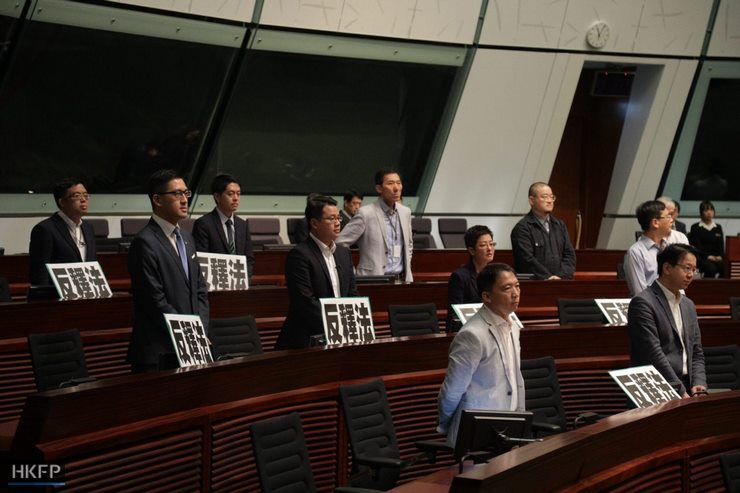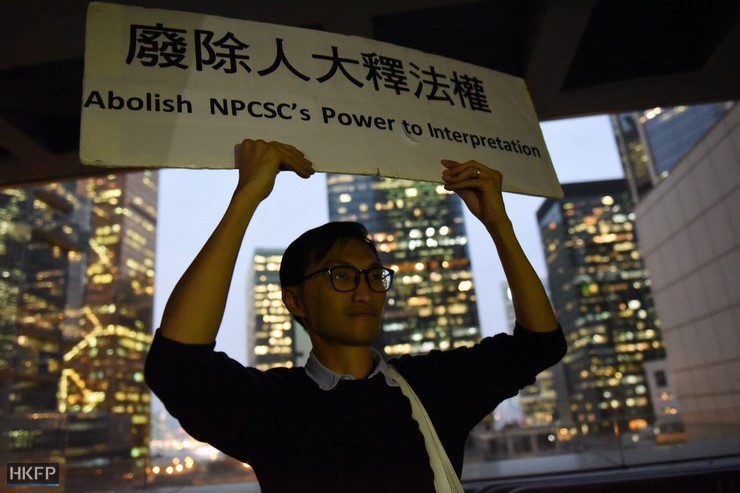How does an authoritarian regime silence dissenting voices within the framework of rule of law and full civil liberties? It can’t, which means one of two things: it engages in an endless game of whack-a-mole smacking down every act of dissent on a case-by-case basis, or it has to dispense with rule of law and civil liberties. The latest interpretation of Hong Kong’s Basic Law by the National People’s Congress Standing Committee looks like yet another round of whack-a-mole, but it also looks like Beijing is getting tired of that game.
While Beijing undoubtedly intended to disqualify the two Youngspiration legislators Baggio Leung and Yau Wai-ching and dispose of this matter definitively, the hurried interpretation of Article 104 of the Basic Law, which is expressed in typically vague PRC legal language, may not be as definitive under Hong Kong law as Beijing hopes.

Among the many troubling points and lingering uncertainties in the text of the interpretation, the interpretation places the power to determine whether an oath has been properly taken, and therefore to disqualify a legislator, entirely in the hands of the oath administrator. This would seem to give the oath administrator significant discretionary power to disqualify legislators. (Recall that the Electoral Affairs Commissioner disqualified candidates running for office in the LegCo elections on the basis that he did not believe their declarations to be “genuine” based on past behaviour.) However Hong Kong law should permit the oath administrator’s decision to be subject to judicial review by the courts. This may leave the question of what constitutes a solemnly-taken oath open to ongoing argument and judicial interpretation, including through the ongoing court case regarding Leung and Yau currently before the High Court.

The interpretation also states that no arrangement may be made for retaking an invalid oath. The interpretation does not state whether this will have retroactive effect to disqualify Leung and Yau whose “invalid” oath-taking occurred before this interpretation was announced. Officials stated in their subsequent remarks that the interpretation should apply retroactively since in Beijing’s view the meaning elucidated by the interpretation has always been lying there latent within the law just waiting to be discovered.
However, in common law legal systems (such as Hong Kong’s), the courts will generally make a presumption that a law is not intended to be retroactive unless it is explicitly stated to be so (in the text of the law — not in ad hoc comments by officials at press conferences). So, for example, if the LegCo president refuses to allow Baggio and Yau to retake their oaths based on this interpretation, and that decision is then subject to further judicial review, it would be open to the court to decide that this interpretation should not apply retroactively to prevent Baggio and Yau’s re-taking their oaths. However it may be a brave judge that says so, given the circumstances.

The most troubling aspect of the interpretation is the final paragraph which states: “An oath taker who…after taking the oath, engages in conduct in breach of the oath, shall bear legal responsibility in accordance with law.” This purports to impose an ongoing obligation for legislators to continue to be tested against the contents of their oath. This would act as a significant constraint on legislators’ future behaviour. Beijing’s intention would appear to be that anyone who subsequently breaches the oath — by, for example, advocating self-determination, independence or any other views Beijing deems to be “disloyal” — could be summarily kicked out of office.
However the paragraph states, in language typical of PRC legislation, only that they will “bear legal responsibility in accordance with law”. The applicable Hong Kong law here is Article 79(7) of the Basic Law which requires a vote of two-thirds of the members of LegCo censuring a member for breach of oath before they can be disqualified. As long as the anti-establishment parties maintain control of more than one-third of LegCo seats they would be able to block any such censure motion. This may be fruitful ground for a further “interpretation” in future if things don’t go Beijing’s way.
Finally, it is worth pointing out that Article 104 of the Basic Law — the provision on oath-taking around which this whole controversy revolves — applies not only to LegCo members but also to other government officials and, most notably, to judges. The interpretation may flag Beijing’s intention for an ongoing political test to be applied to all Hong Kong officials including the judiciary. This would spell the end of judicial independence in Hong Kong, and the death-knell for Hong Kong’s rule of law.
Antony Dapiran is a Hong Kong-based lawyer and writer. Follow him on Twitter.
